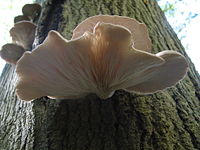
Photo from wikipedia
Abstract Vetiver grass is an ideal plant for 2,4,6‐trinitrotoluene (TNT) phytoremediation, due to its ability to tolerate and metabolize TNT as previously reported. The current study is the first attempt… Click to show full abstract
Abstract Vetiver grass is an ideal plant for 2,4,6‐trinitrotoluene (TNT) phytoremediation, due to its ability to tolerate and metabolize TNT as previously reported. The current study is the first attempt to investigate the changes in the proteomic profile of a plant under TNT stress. Vetiver plants were grown in nutrient media with varying concentrations of TNT (0, 25, 50, and 100 mg L−1) for 10 days. Although the plants appeared healthy, significant biomass reductions (p = 0.0008) were observed in treated plants. Total proteins in the root decreased significantly (p = 0.0003). Proteomic analysis of root proteins revealed the downregulation of functional proteins involved in key cellular mechanisms such as transcription, ribosome biogenesis, nucleo‐cytoplasmic transport of proteins, protein glycosylation, and translation. Growth‐related proteins were downregulated; plant defense proteins were upregulated at lower TNT concentrations but downregulated at higher concentrations. Comprehensive understanding of changes in the proteomic profile provides important clues to the mechanism of TNT stress response and tolerance in vetiver.
Journal Title: GeoHealth
Year Published: 2017
Link to full text (if available)
Share on Social Media: Sign Up to like & get
recommendations!